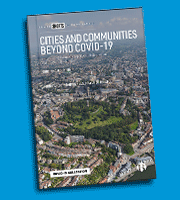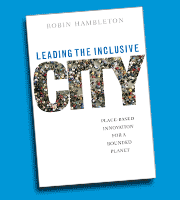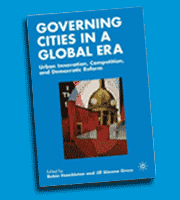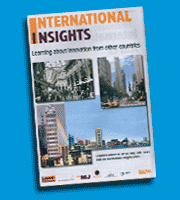 Current comments
Current comments
In this section we provide comments on matters of topical interest relating to city leadership and urban management. The topics are:
• Northern lights – localism in Sweden
• How to be green in a recession
• A Jeckyll and Hyde localism bill
• Leading places in changing times
• Place-based leadership
• Total place
• Tackling climate change
• The modern university
• Our urban future
Northern lights – localism in Sweden
The proposals emerging from the UK Coalition Government to strengthen the fiscal power of UK local government are feeble. This article, published in MJ on 20 October 2011, summarises the main features of the powerful system of local government found in Sweden. Local authorities in Sweden raise 70% of their revenue from local taxes, have rights to local self-government enshrined in the Swedish constitution, and a voter turnout of over 80%.
How to be green in a recession
Tackling climate change should not be sidelined by the immediate needs of battling the recession and coping with public spending cuts. This article, published in MJ on 3 February 2011, examines the achievements of Freiburg, Germany – one of the leading eco-cities in Europe – and draws lessons for UK local government.
A Jeckyll and Hyde localism bill
The Localism Bill opens up new possibilities for local government in England, but these opportunities are heavily constrained. This article, published in Town and Country Planning in January 2011, analyses the mixed messages emanating from Eland House. The rhetoric around ‘localism’ and the ‘big society’ in the ‘Essential Guide’ (published with the bill in December) signal the intention to reduce the dominance of central government in public policy-making. But a closer reading of the bill suggests that it contains many centralising measures.
Leading places in changing times
In an era of resource constraints it is vital for leaders to focus on redesigning services with the public – to create new connections and new relationships. This requires a new emphasis on the leadership of communities in particular places.
Ideas on how to bring about public service innovation by focussing on place-based leadership are provided in:
Place-based leadership and public service innovation
This Think-piece explores three related themes: 1) Innovation in public service reform needs better leadership, 2) Place-based (or civic) leadership is weak in the UK, and 3) UK universities are the sleeping giants of civic leadership. The discussion identifies six propositions indicating avenues that could be explored to improve public service innovation. The Think-piece is intended to provoke fresh thinking in relation to the potential of place-based leadership to bring about radical innovation.
Total place
Launched by Chancellor Alastair Darling in May 2009 the Total Place initiative is a bold approach to public service reform that has attracted a good deal of attention in UK public policy circles. The approach involves working out the total public spending going into a locality and then examining how local bodies can work more creatively to tackle local problems. This idea of a ‘Total Approach’ is not a new one. This article, published in MJ under the title ‘New wine in old bottles?’ on 18 February 2010, outlines lessons for Total Place from the Total Approach efforts of the 1970s.
Tackling climate change
The UK Climate Change Act 2008 introduced a statutory target of reducing carbon emissions to 80% below 1990 levels by 2050, and an interim target of 34% by 2020. Related measures – such as the EU directive on renewable energy and the UK Energy Act 2008 – are spurring local innovations to tackle climate change. Some other countries – for example, Sweden – are ahead of the UK in relation to the climate change agenda. First published by the IDeA/NESTA in 2009, this paper on tackling climate change in Malmo provides an inspiring example of bold place-based leadership.
The modern university and local leadership
Urban answers works with policy makers in higher education to develop innovative approaches to ‘engaged scholarship’. Universities can play a vital role in helping to solve problems encountered in local communities and they can also contribute to place-based leadership. Robin Hambleton has written a number of articles for Times Higher Education on this theme.
Our urban future
In 2007 – demographers argue about the precise date – the urban population of the world overtook the rural. More important, population projections for the planet suggest that the urban population of the world is set to climb from 3.3 billion in 2007 to 5 billion in 2030. Robin Hambleton outlines ways in which city leaders can respond to this unprecedented challenge.





